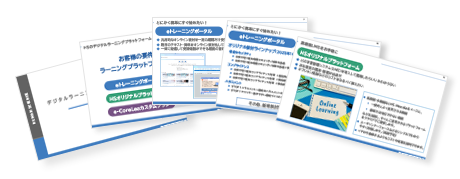2021.09.06
What is Knowledge Management?
"There is a knowledge gap among members, and it cannot be said that operations are efficient. Regardless of skills, is there a way to standardize knowledge and know-how?"
"In recent years, there has been a lot of turnover, and we tend to spend a lot of time on training. It's an important phase, but I wish there were easier ways to do it..."
Have you ever thought about such things?
In recent years, the advancement of technology and the sophistication of business operations have led to a demand for even more efficient workflows. One of the most accessible routes to achieving efficient operations is the standardization of business knowledge, skills, and know-how. However, no matter how much time you have, it is not enough to teach everything step by step. In considering the efficiency of education, knowledge management is one of the methods that comes to the forefront.
In this article, we will introduce knowledge management. We will explain the basic knowledge related to knowledge management, the benefits of utilizing it, and the methods to achieve knowledge management. We hope you can use this article as a reference to help standardize knowledge and know-how.

1. Basic Knowledge of Knowledge Management
Knowledge management is a management method that enhances a company's competitive advantage by sharing and utilizing the knowledge and know-how accumulated by teams and individuals. A simple example would be spreading the skills acquired by individuals within the company.
For example, let's say there is a person named A who works for a company that develops IT systems. Suppose A has mastered a programming language that no one in the company has used before. A then conducted training sessions and created tips within the company, spreading the newly learned programming language.
So, what do you think? We are now able to challenge ourselves in the field of program development, which we could not tackle as a company before. It is certainly not possible to say that the company's competitiveness has increased with just one person, A, taking on program development. However, since we are now able to approach it as a company, our competitiveness as a company has improved.
Knowledge management is about enhancing a company's competitive advantage in the market through the sharing and utilization of knowledge and know-how. Two social changes are related to the growing attention on knowledge management.
Reason 1 for the growing attention on knowledge management: Labor mobility
One reason why knowledge management has gained attention is the fluidity of labor. This is because the current labor environment has become fluid, making it necessary to consciously accumulate knowledge and know-how.
For example, let's say there is an engineer A who is the only iPhone app engineer in the company. As long as that engineer is present, there is no problem accepting work related to iPhone apps. However, what happens if engineer A changes jobs?
Since there is no knowledge or know-how related to iPhone apps left in the company, it will no longer be able to take on projects related to iPhone apps in the future. You might consider this an extreme example, but if knowledge and know-how are not retained, such situations can indeed occur.
In the past, Japan's lifetime employment system allowed companies and individuals to naturally accumulate knowledge and know-how. Since both companies and individuals were expected to stay for a long time, there was a flow of returning knowledge and know-how to both parties. However, as represented by the restructuring during the bubble collapse, the lifetime employment system has recently broken down. With job changes and independence becoming common, the need for knowledge management has arisen.
Reason 2 for the growing attention on Knowledge Management: Acceleration of speed in business
The second reason why knowledge management has gained attention is the acceleration of business speed. With the advancement of technology centered around IT, the speed of business has increased to an extent that is incomparable to the past. As a result, if we approach tasks at the same speed as before, we can no longer win in competition.
To keep up with the speed of modern business, it has become necessary for each person in charge to have the same level of knowledge and skills to respond with the same accuracy and speed. This is why knowledge management has gained attention.
2. Benefits of Knowledge Management
In the previous chapter, we introduced the basic knowledge of knowledge management. The purpose of knowledge management is to permeate the tacit knowledge and know-how that individuals possess, which are difficult to verbalize or quantify, into companies and individuals. Knowledge management can be said to be the conversion of tacit knowledge into explicit knowledge.
There are two benefits to implementing knowledge management.
Benefit 1 of Knowledge Management: Streamlining Operations
The first benefit of knowledge management is the efficiency of operations. By converting the knowledge and know-how held by teams and individuals into assets for the entire company, an overall improvement in quality can be expected.
For example, let's say there is a person named A who is skilled in handling complaints. By systematizing this difficult-to-articulate skill in communication through methods such as manuals, we aim for widespread adoption across the organization. As a result, complaint handling that was previously only possible by A can now be performed by other members as well. With other members also able to handle complaints, the number of processed complaints will dramatically increase.
Benefit 2 of Knowledge Management: Streamlining Education
The second benefit of knowledge management is the efficiency of education. In knowledge management, knowledge and know-how are visualized in the form of text and numbers, which significantly improves the efficiency of education.
For example, let's say Mr. A, who is skilled in handling complaints, used to hold face-to-face training sessions irregularly for the development of junior staff. If even one-third of the content covered in the training were to be documented in a manual, what would happen? Not only could the costs associated with overall education be reduced, but it would also allow for preparation and review, making education more efficient.
The former education style was "Learn by watching and imitating." In a world where lifetime employment was the norm, this style might not have been bad.
However, today, labor shortages are becoming prominent. To make new employees productive as quickly as possible, improving the efficiency of training is urgent.
In knowledge management, the tacit knowledge held by companies is converted into explicit knowledge, significantly increasing the speed of knowledge and know-how transfer to individuals.
Amidst the numerous technologies and management methods that have come from abroad, knowledge management, which transforms tacit knowledge into explicit knowledge, is said to have originated in Japan. In the 1990s, the theoretical model of knowledge management was presented by economist Ikujiro Nonaka. It is called the "SECI Model."
The SECI model divides the knowledge acquisition process into four parts, and through the repetition of these processes, knowledge can be further deepened and created. The name SECI is derived from the initials of the four processes.
- ・Socialization: Sharing knowledge and experiences between individuals to increase tacit knowledge.
- ・Externalization: Making tacit knowledge visible and converting it into explicit knowledge.
- ・Combination: Combine explicit knowledge with explicit knowledge and systematize it.
- ・Internalization: Incorporate explicit knowledge to transform it into one's own tacit knowledge.

3. To implement knowledge management
In the previous chapter, we discussed the benefits of knowledge management. Finally, in this chapter, we will introduce methods for implementing knowledge management.
To realize knowledge management, implementing tools can be considered the most straightforward approach. This is because it is necessary to make tacit knowledge accessible to everyone in order to convert it into explicit knowledge. Knowledge management cannot be established if solutions to problems or new methodologies cannot be acquired through observation or experience. Additionally, to disseminate the acquired knowledge, it needs to be expressed in a publicly accessible place. Therefore, implementing tools can be said to be the simplest method.
Generally, knowledge management tools have the following three functions. We hope this will serve as a reference for choosing a knowledge management tool.
However, it is not necessarily the case that all three functions are required. Understanding your company's needs and selecting a tool that matches those needs will likely provide better cost performance.
Knowledge Management Tool Feature 1: e-Learning
E-learning, which allows individuals to progress in their learning, is one of the most effective methods for disseminating knowledge. In recent years, the use of videos in e-learning, in addition to text, has become widespread, enabling the transmission of various types of knowledge to the target audience.
Knowledge Management Tool Feature 2: Groupware
Groupware that allows information to be shared among members is a reliable method during problem occurrences.
For example, let's say a trouble occurs where the system is not functioning. Solving the problem alone can take time, but by sharing information through groupware, it is possible to receive a lot of help.
You may receive technical advice, and there is also a possibility that solutions for similar phenomena will be shared.
This is a recommended method for those who want to value communication while imparting knowledge.
Knowledge Management Tool Feature 3: Document Management
The most straightforward way to convey knowledge is through documentation in the form of text. For example, if the knowledge and know-how possessed by individuals are compiled into a manual, anyone, regardless of age, can access that knowledge. Managing documents like manuals is also a role of knowledge management tools.
We have introduced features that realize knowledge management up to this point, but some may feel that suddenly implementing the tools is a high hurdle. Many may be considering trying to implement even just a part of the features we have introduced. For example, the introduction of highly effective e-learning or manuals that are easy to convey as explicit knowledge.
4. Knowledge Management Tool: Moodle
One of the recommended tools for knowledge management is Moodle, a Learning Management System (LMS).
Moodle is open-source software that supports multiple languages and is used globally, with over 200 million users currently utilizing the tool.
Open-source software (OSS) is software whose source code is made publicly available for free, allowing anyone to modify and redistribute it freely. Because there are no licensing fees, it offers cost benefits and is utilized by companies with high employee turnover, such as part-time and temporary workers.
Additionally, since companies can add necessary features unique to their needs, it can be customized to be the most user-friendly for the organization.
The range of files that can be uploaded is also broad, making it easier to transition existing data, such as when there are existing documents like manuals in Word, where "it's faster to convey in words" or "there's already a manual in Word" for knowledge management.
Moodle has group functions, allowing the creation of groups such as "this document for this sales department" or "this video for new employees," enabling file sharing only with specific employees, making it user-friendly for administrators and ensuring it can be safely used even in large companies with a wealth of knowledge.
Additionally, you can check progress information at any time on the dashboard, and with the reporting feature, management is easier, allowing you to understand your learning progress through reports.


5. Leave Moodle implementation to Human Science
Our company became an official Moodle partner in 2017, certified by the Moodle headquarters in Australia. Only companies with expertise and a proven track record in Moodle development and implementation are recognized as official partners, and while there are many around the world, there are only a few in Japan, with our company being the number one in domestic achievements for schools and organizations.
As an official partner, we have access to a dedicated site where we can obtain information necessary for the implementation and operation of Moodle.
Additionally, we can raise requests to Moodle Headquarters, which allows us to influence future Moodle development.
Our company first conducts a hearing of the customer's requirements for implementation, followed by design, construction, and lectures for usage.
Furthermore, even after implementation, we provide support such as post-usage tuning and usage seminars, aiming to establish a system that can offer all the necessary services to achieve the customer's objectives.
In addition to Moodle, Human Science has an outstanding track record in e-learning and manuals to achieve knowledge management. If you have any issues with knowledge management, please feel free to consult with Human Science.
> Moodle Implementation Support and Operation
Feature 1 of Human Science:Extensive manual production experience, primarily with large and global companies
Human Science has a track record of producing 3,148 business manuals for 243 companies, primarily in the manufacturing and IT industries. We have had renowned companies as clients, including "Microsoft Japan Co., Ltd.", "Cygames, Inc.", and "Mitsubishi Electric Corporation".
Feature ② of Human Science:Track record of educational support specialized in e-learning
Human Science has been involved in the development of over 2,693 e-learning educational systems to date. We can support all aspects of e-learning, from the creation of teaching materials to the selection of LMS.
Contact Information:
Phone Number: 03-5321-3111
hsweb_inquiry@science.co.jp












